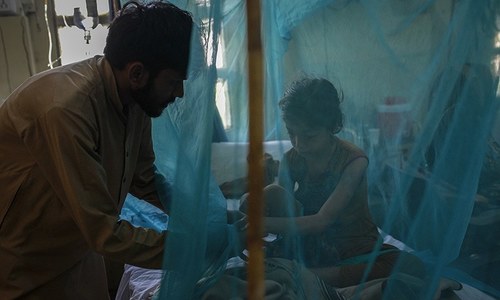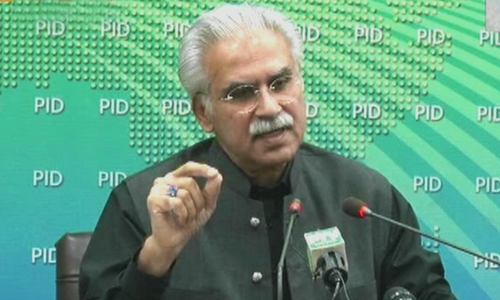KARACHI: Public and private sector hospitals in Karachi have been receiving a growing number of high-grade fever cases on a daily basis and many of them are being tested positive for dengue, it emerged on Tuesday.
As per official data, over 1,100 dengue cases have been reported in the metropolis in October alone.
According to media reports, dozens of residents in North Nazimabad’s Block F have fallen ill “due to dengue including many students of a local madressah”.
An inquiry involving residents of the area and government officials showed that the neighbourhood was being considered as a dengue hotspot by authorities and that the patients had been reporting at different hospitals — the Liaquat National Hospital, Jinnah Postgraduate Medical Centre, Ziauddin Hospital and Abbasi Shaheed Hospital — with complaints of high-grade fever over the past one week or so.
“North Nazimabad is a dengue hotspot along with Garden East, Union Council 4 of Metroville, Clifton Cantonment Board and Soldier Bazaar,” said Dr Abdul Basit of Sindh’s Dengue Control Programme.
He said that the department received data from hospitals and carried out fumigation in affected houses located in areas where a cluster of cases were reported.
“Routine fumigation is the responsibility of the Karachi Metropolitan Corporation and respective district municipal corporations. People can contact us at our helpline number (0313-2597585),” he said when asked why fumigation was not launched before the monsoon which might have restricted the scale of the outbreak.
Over 1,100 dengue cases
According to the data so far compiled by the department, 115 dengue cases were reported in Karachi on Tuesday while eight in the rest of Sindh’s districts.
An estimated 4,403 dengue cases have been reported this year in Sindh out of which 4,151 were reported in Karachi. The mosquito-borne disease has claimed lives of 15 people this year.
In October, 1,186 cases have been reported, of them 1,105 in Karachi.
Asked about the media reports regarding the dengue outbreak in North Nazimabad, JPMC executive director Dr Seemin Jamali said indeed the hospital was receiving a growing number of high-grade fever cases these days. Only those patients, however, were being admitted who required emergency care.
“The diagnosis takes some time. What we can say for sure at this time is that the hospital is receiving a high number of high-grade fever cases that might be due to different infections (including malaria, typhoid),” she said.
The JMPC had received 150 dengue cases over the past two and a half months, she added.
In her opinion, the major reason behind the high number of dengue cases this year was lack of any fumigation drive in the city.
PMA concern
Meanwhile, the Pakistan Medical Association (PMA) has expressed concern over the rising dengue cases in the country.
“Cases of confirmed dengue virus have been reported in thousands in all the four provinces. The situation is very alarming and we had already warned the authorities to take preventive measures to control dengue.
“The government should immediately start anti-mosquito spray campaigns on an emergency basis throughout Pakistan because the disease could only be prevented by eliminating mosquitoes. There is no vaccine or specific treatment to combat this disease,” said a PMA press release.
People should know that dengue symptoms may include high-grade fever, headache, vomiting, muscle and joint pains.
“It can also be associated with characteristic skin rash. In worst condition, there could be bleeding from gums, nose, mouth, ears and other parts of the body. In the last stages patient goes in shock, which is called Dengue Hemorrhagic Shock,” it said.
Published in Dawn, October 9th, 2019













































